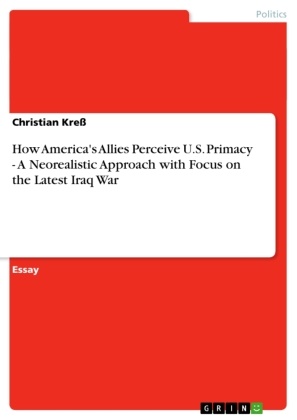Mehr lesen
Essay from the year 2007 in the subject Politics - International Politics - Region: USA, grade: 1,0, University of Queensland, language: English, abstract: Nowadays, the United States of America is undoubtedly the most powerful country in the international arena. Its primacy in the world is chiefly based on its extraordinarily large military capabilities and strong economy. U.S. leaders and citizens consider the U.S. primacy to be a force for good, which is intrinsic to American exceptionalism, i.e. the idea that the USA can and should help make the world a better place. As former president William Clinton put it: the United States is a "beacon of hope to peoples around the world," and is "indispensable to the forging of stable political relations." However, there are plenty of other countries whose leaders and citizens are not pleased with U.S. primacy, some of them even considering it to be dangerous. Concerns of other states have grown since George W. Bush has become president who - by making use of U.S. primacy - has been embarking on a more unilateral foreign policy than his predecessor has. Even close allies have become more worried about the United States' influence in world politics. In November 2003, some months after the latest U.S. invasion of Iraq, a poll conducted by BBC revealed that 53 percent of Europeans considered the United States to have a negative role on peace in the world. This essay illustrates why even the United States' allies have reason to fear and actually do fear U.S. primacy. This thesis is going to be substantiated by analyzing in detail the opposition of Germany and France, both close allies of the United States, to George W. Bush's plan to invade Iraq during the time that lead up to the invasion in March 2003. Initially, though, this essay is going to shed light on what makes the U.S. being the independent strongest actor in world politics and how its unilateralism can be made sense of in the context of the theory of structural realism, as outlined by Kenneth N. Waltz.

